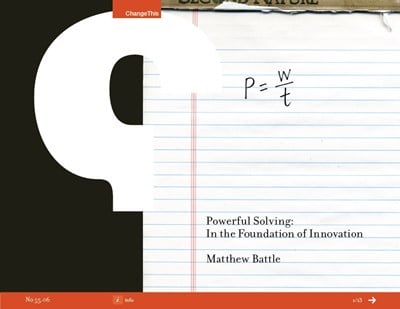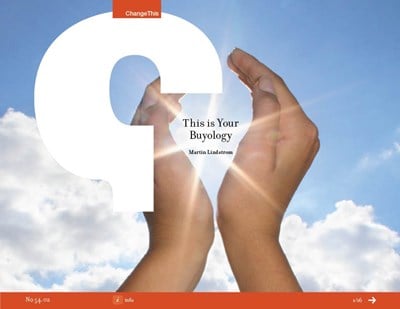
ChangeThis
ChangeThis is our weekly series of essays from today's thought leaders that are meant to evoke conversation by bringing forth new and unique ideas.
ChangeThis
-

Blog / ChangeThis
Learning to View Your Customers as a Powerful Tribe
By Porchlight
"As a business it's tempting to think of a 'tribe' as a 'customer base.' That's wrong. People aren't part of a tribe simply because they buy a product or service. What qualifies them as a tribe are their connections. Tribes of customers are connected to an idea, each other, products, services, employees, etc.—creating a network of connections to the business as a whole."
Categories: changethis
-

Blog / ChangeThis
Self, and Importance. A Call to Reflection and Action
By Porchlight
"When we align ourselves with the opinions of others without examination, we are robbing ourselves of the opportunity to analyze our own preferences and desires, to determine our own solutions. We miss the chance to review the criteria others are utilizing, to question their biases and seek our own inspiration. In stunting the development of our own individual perspectives and initiatives, we trap ourselves in lives that appear to be predestined, and deny the possibility of realizing our personal potential."
Categories: changethis
-

Blog / ChangeThis
Powerful Solving: In the Foundation of Innovation
By Porchlight
"In order to be powerful, you need to deliver as much force, covering as much distance, in the shortest time possible. Consequently, given a force, if you want to improve the power you need to apply the force over a greater range OR decrease the time needed! Let's now make an analogy in the cognitive world. What is the force analogy? Force is the origin of the move in the mechanical world. In the cognitive world, the move is initiated by your ideas. So: F = Ideas Now, let's look at the path."
Categories: changethis
-

Blog / ChangeThis
The Other Climate Crisis
By Porchlight
"One climate crisis is probably enough for you right now. I think there is another one. This one is just as urgent as and has implications just as far-reaching as the crisis we're seeing in the natural world. This isn't a crisis of natural resources. It is a crisis of human resources. I think of this as the other climate crisis. [. . . ] The fact is, though, that human organizations are not at all like mechanisms. They're much more like organisms. They are made up of people driven by feelings and motives and relationships. Most people who work in organizations know that it's their relationships with the other people in it that influence their contributions and loyalty or otherwise. Organizational charts show you the hierarchy, but they don't capture how the organization really works or what it feels like to be in it. This is why agricultural metaphors better illuminate the growth of people and organizations. Farmers base their livelihoods on raising crops. But no matter how good they are, farmers do not make plants grow.
Categories: changethis
-

Blog / ChangeThis
This is Your Buyology
By Martin Lindstrom
"I have spent years talking with brand fans; from obsessed Harley Davidson riders to young Japanese Hello Kitty admirers (one of whom, incidentally, owns more than 12,000 pieces of Hello Kitty merchandise), to devoted Irish Guinness beer drinkers. I've, time after time, been struck by the apparent parallels between the power of religion and of brands over followers. But, in reality, would such a claim possibly hold up? Is it possible that some brands have managed to create their own religion by, coincidently or deliberately, adopting triggers and tactics from the world of religion? The question became an obsession for me."
Categories: changethis
-

Blog / ChangeThis
Leading with Agility
By Kevin Cashman
"Learning Agility, which has four dimensions—Mental Agility, People Agility, Results Agility and Change Agility—is a key to unlocking our change proficiency. In fact, research studies by CCL, Mike Lombardo of Lominger, Robert Sternberg and his colleagues at Yale University, and Daniel Goleman point to Learning Agility as more predictive of long-term potential than raw IQ. Learning Agility is a complex set of skills that allows us to learn something in one situation and apply it in a completely different situation. It is about gathering patterns from one context and using those patterns in a completely new context so that we can make sense and success out of something we have never seen or done before. In short, Learning Agility is Change Mastery—the ability to learn, adapt, and apply ourselves in constantly changing conditions."
Categories: changethis
-

Blog / ChangeThis
The Aesthetics of Management
By Marty Neumeier
"Okay. Everyone knows you can apply aesthetics to the curve of a fender, or the typography of a web page, or the textures in a clothing line. But it can be even more effective when you apply it to decision-making, upstream strategy, or organizational change. When you use the principles of aesthetics to address wicked problems, you can more easily navigate through the fog of complexity. Aesthetics confers a kind of visibility.Let's look at a few of the principles that artists have used successfully, and see how they might apply to management."
Categories: changethis
-

Blog / ChangeThis
Don't Script, Improvise!
By Porchlight
"Businesses built to operate in the Networked World are as different from the Industrial Age models as a computer is from a multi-plane camera. Networked organizations are more biological than industrial. They resemble their employees more than their employees resemble them. They are highly adaptive, mobile, open, sensitive to their environment, and ultra-responsive. They continuously evolve, nurtured by a steady stream of intelligent input from inside and outside the organization. In a networked organization, where good ideas originate is not half as important as how–-and how frequently—those good ideas become reality. Good managers don't try to control their brand's narrative but, rather, to foster an environment in which it can be liberated, expanded and unleashed across networks. The emphasis is not on following a script, but on improvisation."
Categories: changethis
-

Blog / ChangeThis
Better Than Free
By Kevin Kelly
"The Internet is a copy machine. At its most foundational level, it copies every action, every character, and every thought we make while we ride upon it. In order to send a message from one corner of the internet to another, the protocols of communication demand that the whole message be copied along the way several times. [...] Yet the previous round of wealth in this economy was built on selling precious copies, so the free flow of free copies tends to undermine the established order. If reproductions of our best efforts are free, how can we keep going? To put it simply, how does one make money selling free copies? I have an answer. The simplest way I can put it is thus: When copies are super abundant, they become worthless. When copies are super abundant, stuff which can't be copied becomes scarce and valuable. When copies are free, you need to sell things which can not be copied. Well, what can't be copied?"
Categories: changethis
-

Blog / ChangeThis
Smart Networking: End the Resistance, Prepare for Success and Get 24/7 Results Without the 24/7 Effort
By Porchlight
"Though it may be hard to grasp, networking is much easier than you think. Forget the myth that you need to be an extrovert to network well. You don't. Or that you must network nonstop. Absolutely not. Or that networking is all about working the room at a big event with a big fake grin plastered on your face. Far from it."
Categories: changethis
The original idea behind ChangeThis came from Seth Godin, and was built in the summer of 2004 by Amit Gupta, Catherine Hickey, Noah Weiss, Phoebe Espiritu, and Michelle Sriwongtong. In the summer of 2005, ChangeThis was turned over to 800-CEO-READ. In addition to selling and writing about books, they kept ChangeThis up and running as a standalone website for 14 years. In 2019, 800-CEO-READ became Porchlight, and we pulled ChangeThis together with the rest of our editorial content under the website you see now. We remain committed to the high-design quality and independent spirit of the original team that brought ChangeThis into the world.

